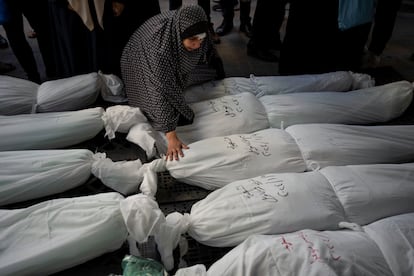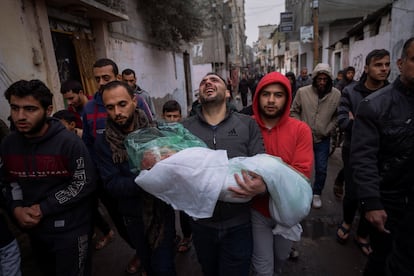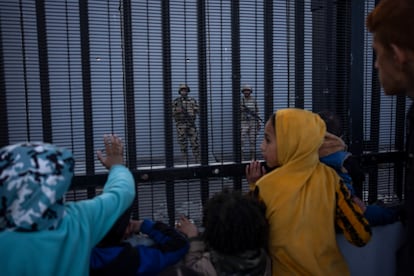International justice and genocide in Gaza
The underlying question is whether the Hamas attacks of October 7 explain and justify everything. Was it the big ‘flashpoint’ of what is occurring now?

Israeli genocide in Gaza? Since there are treaties on the subject and it falls under the jurisdiction of international institutions, the International Court of Justice (ICJ) will have to resolve this question with a decision that will be, by definition, binding. That is to say, one of obligatory compliance, for Israel and the international community.
South Africa, a state party to the 1948 Convention on the Prevention and Punishment of the Crime of Genocide, presented an 84-page submission to the ICJ on December 29 for a ruling. It alleges that Israel is committing genocide in Gaza and substantiates this with eight well-supported allegations, as well as devastating evidence that Israel has breached its obligations under the Convention.
A decision on the merits of the case will not be immediate. But South Africa has asked the court for interim measures “as a matter of extreme urgency” ordering Israel to halt its attacks in the Gaza Strip to protect Palestinians and preserve evidence.
Hearings on the matter have already been held in The Hague, on January 11 and 12, and the ICJ will have to rule soon. With a decision that could point to a ceasefire order which, for obvious reasons, would stop the war and the machine of devastation set in motion by Israel three months ago, with the Dantesque results that are known to the world.

The decision on the provisional measure would be binding, as are all decisions taken by international tribunals. Its compliance can be supervised both by the ICJ itself and by the United Nations Security Council. They could therefore have an immediate effect in the face of the uncontainable devastation underway.
In addition to the relevance of the provisional measures requested, this process stands out due to possible repercussions in at least two other fundamental aspects.
Firstly, because of the merits of the case, South Africa is asking the court “to ensure Israel’s compliance with its obligations under the Genocide Convention not to engage in genocide, and to prevent and to punish genocide.” The court will have to rule on this core issue.
Secondly, because it will analyze the facts brought to the court’s attention and the known factual framework: 23,000 people killed in Gaza, including thousands of children. To understand this devastation and death as an act of national “self-defense” by Israel would be to presume the untenable assumption that the only security for Israel is that Gaza is crushed and emptied.
Thirdly, because of the various public statements by senior Israeli officials that lead one to conclude that the acts of devastation are not accidental or a “mistake,” but a purposeful objective, that 100% fits the classification of genocide with what has happened in Gaza.
Just four examples:
1) Netanyahu, urging Israelis to “remember” the Old Testament account of the slaughter of the Amalekites: “Now go, attack the Amalekites and totally destroy all that belongs to them. Do not spare them; put to death men and women, children and infants, cattle and sheep, camels and donkeys.”
2) Defense Minister Yoav Gallant, announcing that “Gaza will never go back to what it was: we will eliminate everything.”
3) Former Minister of Energy and Infrastructure and current Foreign Affairs Minister Israel Katz, on Gazans: “They will not receive a drop of water or a single battery until they leave the world.”
4) Colonel Yogev Bar-Sheshet speaking on Israeli TV from Gaza: “Whoever returns here, if they return here after, will find scorched earth,” he said. “No houses, no agriculture, no nothing. They have no future.”
On the merits, the alleged “self-defense” to justify the violence in Gaza will hardly be accepted by the court. Primarily, because for “legitimate self-defense” to be so, acts of genocide cannot be excused or justified.
The facts speak for themselves. And as South Africa stated in court, nothing Israel has done since October 7 has been aimed at a targeted retaliation against Hamas or the rescue of hostages. Israel has rescued only one captive, while Israeli soldiers killed three hostages who were waving a white flag. Almost all the 110 Israeli hostages who have returned home were released via truce, negotiation, and prisoner exchange.

The underlying question is whether the Hamas attacks of October 7 explain and justify everything. Was it the big “flashpoint” of what is occurring now? Absolutely not. That idea is wrong and unsupported by history. There are incontrovertible historical facts that can no longer be ignored.
The chronology of the context of horror stretches over several decades. It did not begin on October 7. In his intervention before the ICJ, South African lawyer Max du Plessis stated that the decades-long oppression of Palestinian rights by the State of Israel must be seen as the crucial context of the violence in Gaza.
There are two fundamental facts that form a compelling piece of history: One, the Israeli occupation after the 1967 war of aggression. When Israel took Palestinian territories and the Golan Heights, not only did it never return them, but it established an apartheid against the Palestinians living in them, alongside the increasing proliferation of Israeli settlements outside Israeli borders, particularly in the occupied West Bank.
Two, these are acts of occupation that have been repeatedly condemned by the United Nations, whose resolutions have not been complied with by Israel. All resolutions adopted in the General Assembly or in the Security Council since 1967 have been breached/ignored by the invading state/occupier. It is the longest territorial occupation of the 20th century and, so far, in the 21st century: almost 60 years! Isn’t this the real “pressure cooker” of tension in the region?
While at first glance it may seem shocking that Israel is committing acts of genocide, both its status as an occupying state and the devastation wrought since October of last year will weigh heavily on the ICJ’s analysis and decision. There is the Genocide Convention and a reasonably informed world, despite the fact that dozens of journalists in Gaza (and their families) have died under the unstoppable Israeli bombardment.
Sign up for our weekly newsletter to get more English-language news coverage from EL PAÍS USA Edition
Tu suscripción se está usando en otro dispositivo
¿Quieres añadir otro usuario a tu suscripción?
Si continúas leyendo en este dispositivo, no se podrá leer en el otro.
FlechaTu suscripción se está usando en otro dispositivo y solo puedes acceder a EL PAÍS desde un dispositivo a la vez.
Si quieres compartir tu cuenta, cambia tu suscripción a la modalidad Premium, así podrás añadir otro usuario. Cada uno accederá con su propia cuenta de email, lo que os permitirá personalizar vuestra experiencia en EL PAÍS.
¿Tienes una suscripción de empresa? Accede aquí para contratar más cuentas.
En el caso de no saber quién está usando tu cuenta, te recomendamos cambiar tu contraseña aquí.
Si decides continuar compartiendo tu cuenta, este mensaje se mostrará en tu dispositivo y en el de la otra persona que está usando tu cuenta de forma indefinida, afectando a tu experiencia de lectura. Puedes consultar aquí los términos y condiciones de la suscripción digital.









































